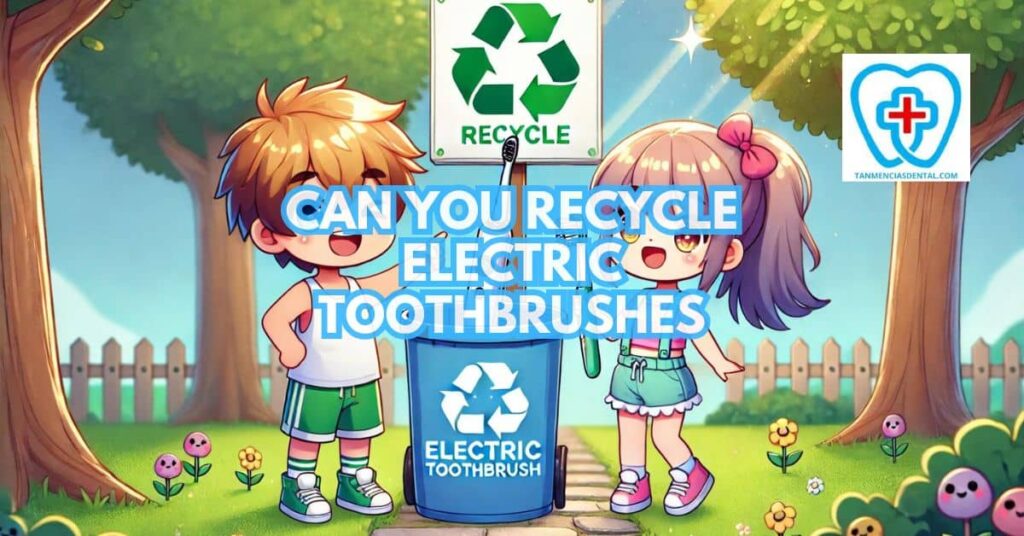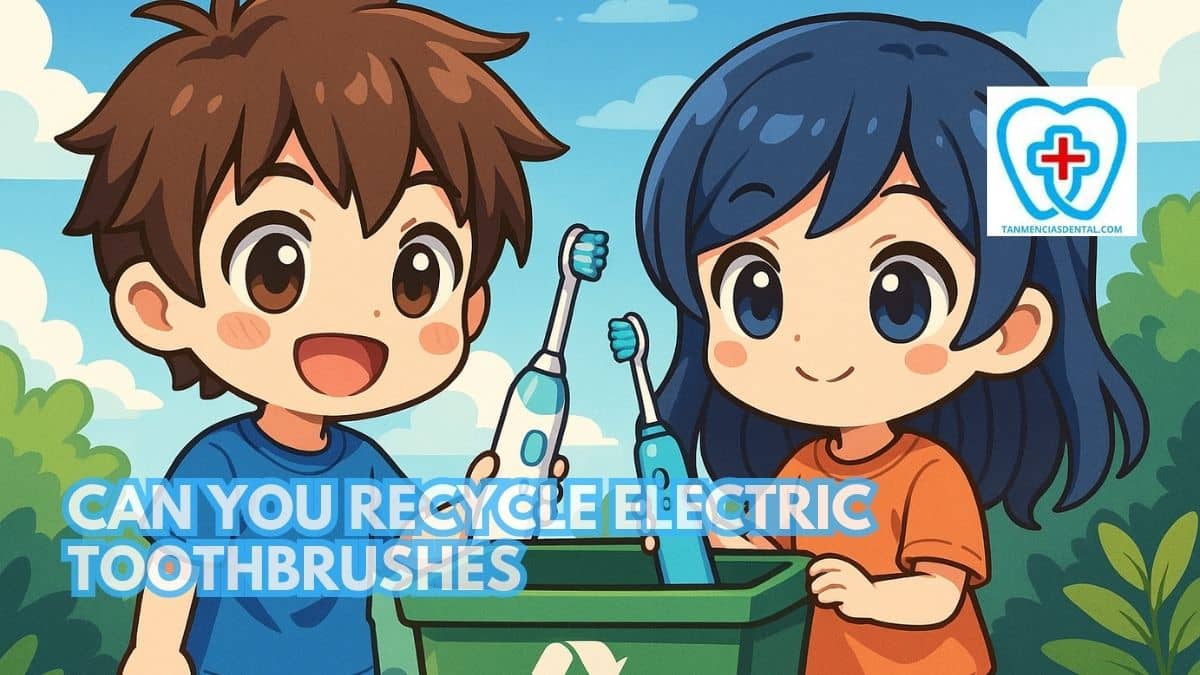Recycling electric toothbrushes is not as easy as recycling a manual toothbrush because they are made of different materials.
Inside the handle, you will find plastic, metal, and electronic parts that must be separated before they can be processed.
Many people ask the question, Can you recycle electric toothbrushes, without knowing the right steps to take.
Batteries in particular need special care since they can cause harm if thrown away with regular trash.
We’ll explain how to handle each part of the toothbrush safely and show responsible ways to reduce waste and protect the environment.
1. Understanding Electric Toothbrush Recycling
Electric toothbrushes are composed of various materials that need to be separated for recycling.
The plastic casing, metal components, and electronic circuits each require different recycling methods, making the process more complex.
Some recycling centers offer specialized toothbrush recycling programs to handle these items efficiently.
They can only process the materials if they are correctly separated and prepared, ensuring that each component is recycled appropriately.
It’s also important to consider the reuse of certain parts where possible, as this can reduce waste further.
Not all parts of an electric toothbrush can be recycled in the same way, so understanding each component’s requirements is crucial.
Learning about these components and their respective recycling processes, along with proper disposal methods for related items like toothpaste tubes and caps, is the first step toward responsible disposal.
🦷 How to Choose the Best Antibacterial Toothpaste for Gingivitis That Really Works
2. Checking Local Toothbrush Recycling Guidelines
Local recycling guidelines can vary significantly, so it’s crucial to check with your local waste management services.
Some areas may have special programs for electronic waste that include electric toothbrushes, dental floss containers, and other dental care items.
Contact your local recycling center or visit their website to find detailed information on toothbrush disposal.
Following these guidelines ensures that you comply with local regulations and helps facilitate the recycling process.
It also reduces the risk of these items ending up in landfills, where they can cause environmental harm.
Inquire about any upcoming recycling events or special collection days in your area that may accept dental care products.
Properly disposing of items like electric toothbrushes and dental floss containers helps promote a cleaner and more sustainable environment.
🦷 Why Dentistry Is Important: How It Saves Lives Beyond Just Smiles
3. Can You Disassemble Your Electric Toothbrush?
Disassembling your electric toothbrush can aid in the recycling process.
Start by carefully removing the brush head and separating it from the handle.
If possible, use a screwdriver to open the casing and access the internal components.
Separate the plastic, metal, and electronic parts into different categories.
This separation makes it easier for recycling centers to process each material correctly, ensuring that as much of the toothbrush as possible is recycled.
🦷 Is It OK To Eat After Brushing Your Teeth?
4. Safety Precautions When Handling Electric Toothbrush Batteries
Removing the battery from an electric toothbrush should always be done with care.
Never puncture or crush the battery because this can cause it to leak or catch fire.
Use simple tools and avoid touching both ends of the battery with metal at the same time.
Place the toothbrush on a flat and non-burnable surface while you are working.
After removing the battery, cover the ends with tape before sending it to a battery recycling center.
🦷 Can Pediatric Orthodontists Prevent Complex Dental Problems? Early Interventions Explained

5. Battery Disposal: A Crucial Step
Battery disposal is a critical aspect of recycling electric toothbrushes.
Most electric toothbrushes have built-in rechargeable batteries, which can be harmful to the environment if not disposed of properly.
First, ensure you remove the battery from the toothbrush before recycling the other parts.
Batteries should be taken to a designated battery recycling facility or drop-off point.
Proper battery disposal prevents toxic substances from leaking into the environment and allows for the recovery of valuable materials.
🦷 Why are My Gums Peeling After Brushing My Teeth?
6. Recycle Electric Toothbrushes or Explore Alternatives
If recycling your electric toothbrush isn’t feasible, look into alternative disposal options.
Some manufacturers offer take-back programs, where you can send back your old toothbrush for proper recycling.
Brands like Philips and Oral-B have such programs in place.
Additionally, some stores have collection bins for small electronic devices, including electric toothbrushes.
Exploring these alternatives ensures that your toothbrush is disposed of responsibly, even if local recycling options are limited.
🦷 How a Children’s Dentist Makes Dental Visits Fun and Stress-Free
7. The Environmental Impact of Responsible Disposal
Proper disposal of electric toothbrushes significantly reduces environmental pollution.
When disposed of irresponsibly, these items can release harmful chemicals into the soil and water.
Recycling helps reclaim valuable materials and reduces the need for new resources.
By taking the time to dispose of your electric toothbrush correctly, you contribute to a cleaner and healthier environment.
It’s a small step that collectively makes a big difference in reducing electronic waste.
🦷 Fresh Breath, No Paste? How to Brush Your Teeth Without Toothpaste and Keep Smiling
8. Brushing Up on Eco-Friendly Oral Care Products
Switching to eco-friendly oral care products can minimize your environmental impact.
Consider using manual toothbrushes made from sustainable materials like bamboo.
Look for toothpaste and floss that come in recyclable or compostable packaging.
Some companies offer recyclable electric toothbrush heads, which can be a more sustainable option.
Adopting these products reduces waste and promotes a greener lifestyle.
🦷 Beyond the Bristles: Creative Ways on How to Clean Teeth Without Brushing
9. Composting Brush Heads: A Maybe for Now
Currently, composting electric toothbrush heads is not a viable option.
The brush heads contain synthetic materials and mixed components that do not break down in compost.
These materials can contaminate the compost and hinder the decomposition process.
While some companies are researching biodegradable alternatives, these are not widely available yet.
For now, focus on recycling the brush heads or finding programs that accept them for proper disposal.
🦷 Brushing Up on Basics: Can You Spread Gingivitis to Others?
10. The Future of Electric Toothbrush Recycling Technology
Advancements in recycling technology may soon make it easier to recycle electric toothbrushes.
Innovations are being developed to handle complex electronic waste more efficiently.
Researchers are exploring methods to separate and process mixed materials found in electronic devices.
Keeping an eye on these developments can help you stay informed about better recycling options in the future.
As technology evolves, recycling electric toothbrushes might become more accessible and effective.
11. Brushing Habits for a Longer-Lasting Toothbrush
Extending the life of your electric toothbrush through good brushing habits can reduce waste.
Follow the manufacturer’s care instructions, such as cleaning the brush head regularly and storing it properly.
Avoid dropping or mishandling the toothbrush to prevent damage.
Replace the brush head as recommended to maintain effectiveness without needing to replace the entire unit frequently.
These practices help maximize the lifespan of your toothbrush and minimize the need for disposal.
🦷 Marikina City Oral Health Providers
👨⚕️ Conclusion
Recycling electric toothbrushes requires awareness and effort, but it is an important step toward sustainability.
By understanding the proper disposal methods, you can reduce your environmental impact.
Follow local recycling guidelines, consider manufacturer take-back programs, and stay informed about future advancements.
In addition, adopting eco-friendly oral care products and extending the life of your toothbrush contribute to a greener lifestyle.
Your responsible actions can lead to significant positive changes for the environment.
😊 Self-Promotion
Visit Tan-Mencias Dental Clinic in Parang, Marikina City, for all your dental needs!
Our friendly and experienced team is here to provide top-notch care in a comfortable environment.
For any questions or to schedule an appointment, you can call us at 9171451074, message us on our Facebook page, or use our website’s contact form.
We’re dedicated to ensuring your dental health, and we look forward to helping you achieve a bright, healthy smile.
Contact us today and experience exceptional dental care!
❔ FAQs
1. Can I recycle the brush head of my electric toothbrush?
Most brush heads contain mixed materials and are not recyclable in regular bins, but some brands or programs accept them for proper disposal.
2. How do I safely remove the battery from my electric toothbrush for recycling?
Carefully remove the battery without puncturing or crushing it.
Cover the battery ends with tape and take it to a battery recycling center.
Some models require a professional for battery removal.
3. Where can I recycle my electric toothbrush if local recycling centers do not accept them?
Many manufacturers offer take-back or mail-in recycling programs.
Stores like Staples or Best Buy may also have e-waste collection bins.
4. Why can’t I just throw my electric toothbrush in the regular trash?
Electric toothbrushes contain batteries and electronic components that can release harmful chemicals and cause fires if not disposed of properly.
5. How does recycling electric toothbrushes benefit the environment?
Recycling prevents harmful substances from polluting soil and water, recovers valuable materials, reduces landfill waste, and decreases the demand for new raw materials.

